We are pleased to share Pathways to Change, our latest impact report. Here, we take an in-depth look at the work of Future Pathways from April 2023 to March 2024. This report helps us to gain a deeper insight into how we make a real difference, and where there is scope for improvement.
You will hear a range of voices throughout this report, including insights from people we support, feedback from Delivery Partners and reflections from our Support Coordinators. Future Pathways is shaped by the voices of the people who interact with our service – their contribution is crucial to developing and improving our work.
In tandem to these insights, our quantitative data helps us to build a clearer picture of how we work, our sphere of influence with other services and information about who we support.
For example, we are learning more about the inequalities that people experience: our data shows that people registered with Future Pathways are more likely than the general population to live in areas of multiple deprivation, have a disability or health condition and experience challenging life circumstances such as homelessness.
However, we also see that the right support has the potential to help address inequalities. People can overcome barriers and take steps towards meaningful change in their lives. This is particularly significant in the context of the inequalities that can be faced by people with lived experience.
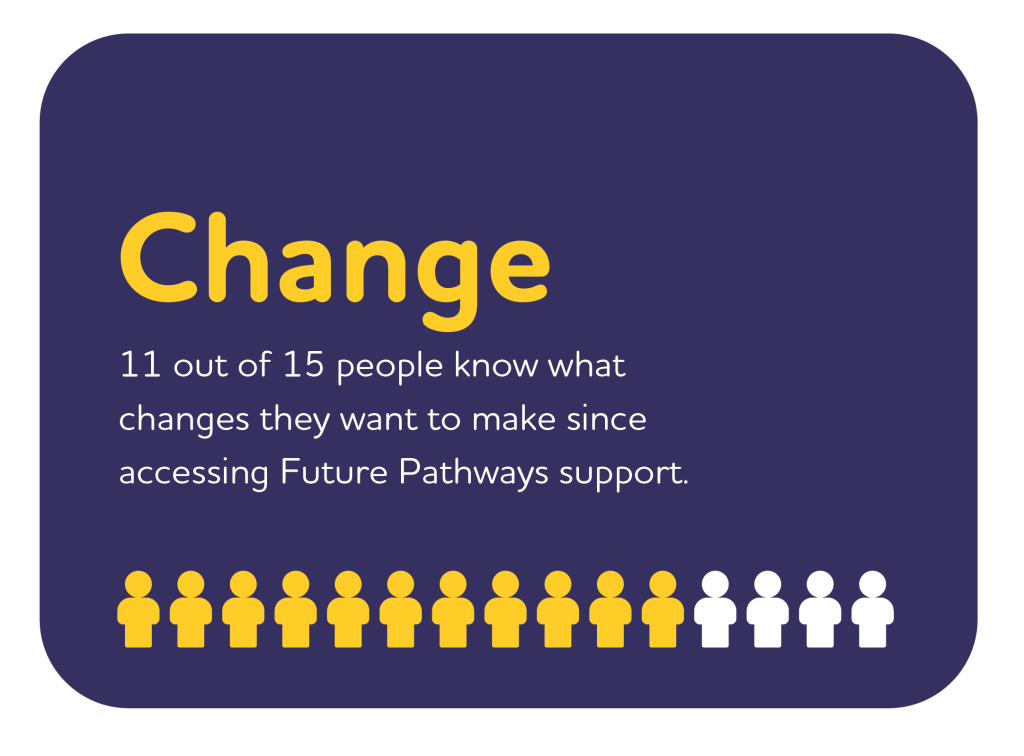
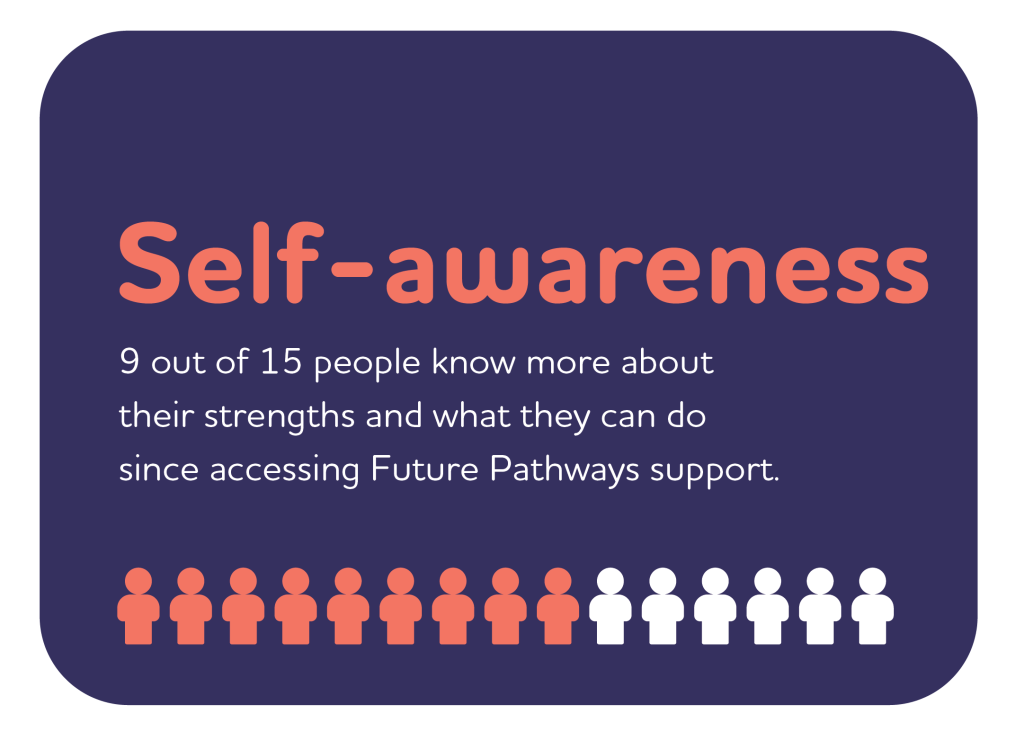
We recognise that support can and should adapt and evolve according to people’s own journey. Our service model’s in-built flexibility allows support – and its accompanying impact – to evolve over the course of someone’s journey with Future Pathways. As such, we find that everyone’s experience at Future Pathways is unique to them too. While there may be common themes, the impact is different for everyone as each person is supported to find their own pathway to change.
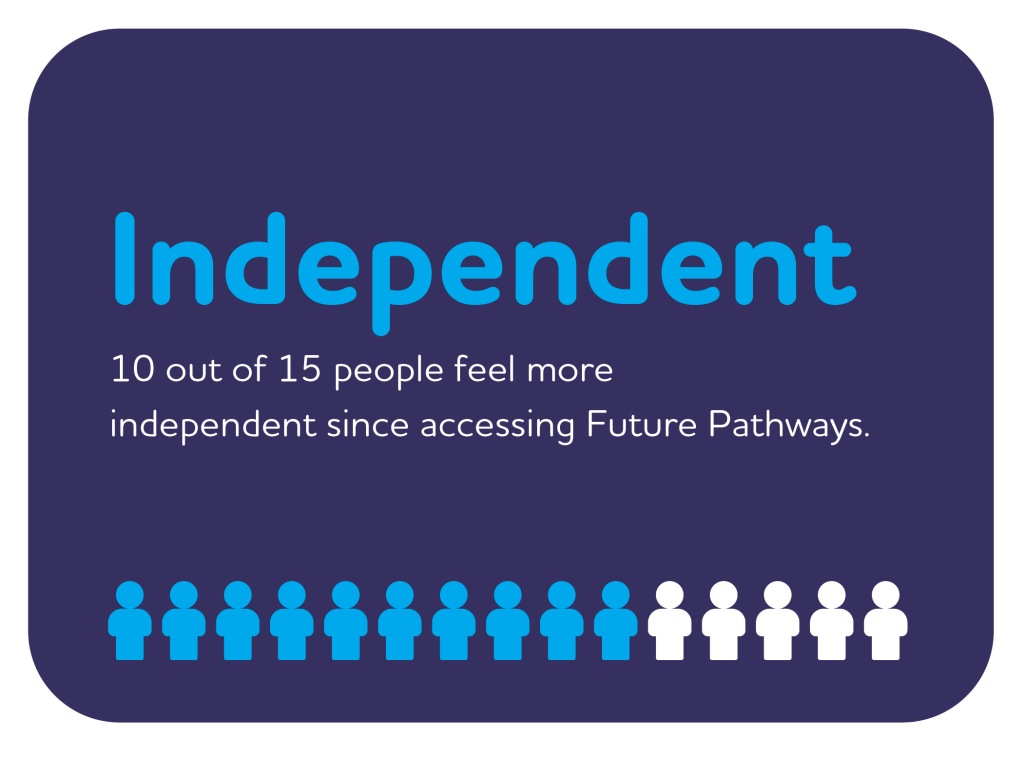
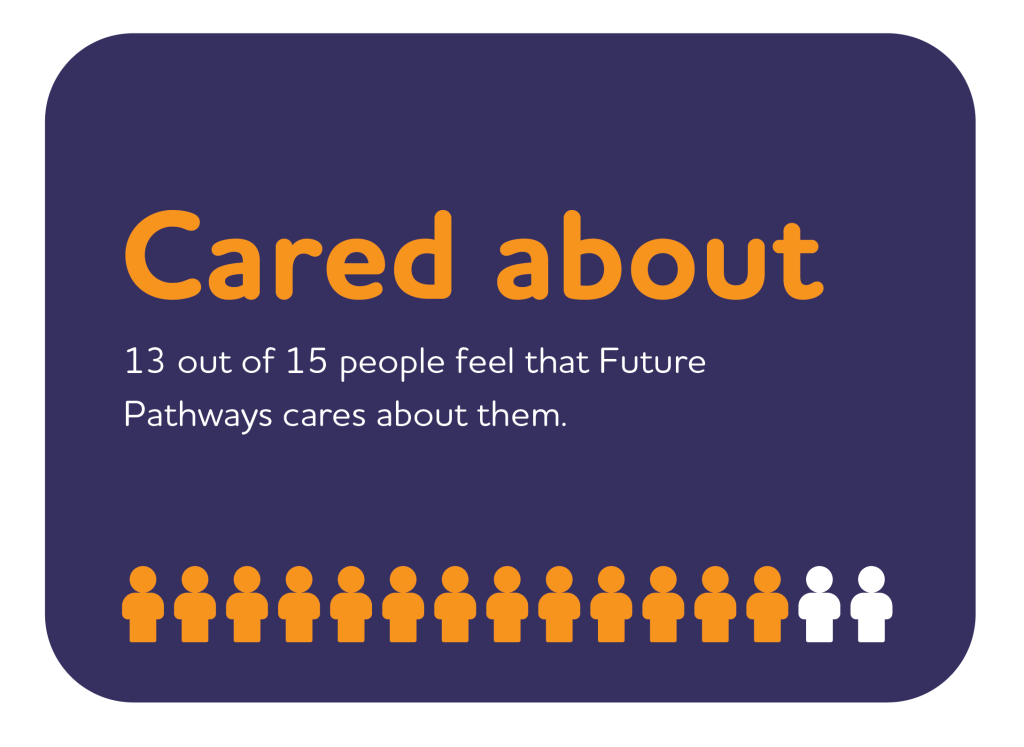
Our impact report highlights how our approach can enhance support. By providing wide-ranging support that is tailored to each person’s circumstances, we are better able to offer support that is right for each person. In addition, we recognise that having choice and feeling empowered is a vital part of the journey – it can lead to increased sense of self-efficacy, independence and feelings of ownership over one’s own life.
Throughout this report, we see that a relational approach is essential. By prioritising relationships and taking a trauma informed approach, we create partnerships that feel safe and trusting in which people feel cared about, understood and valued.
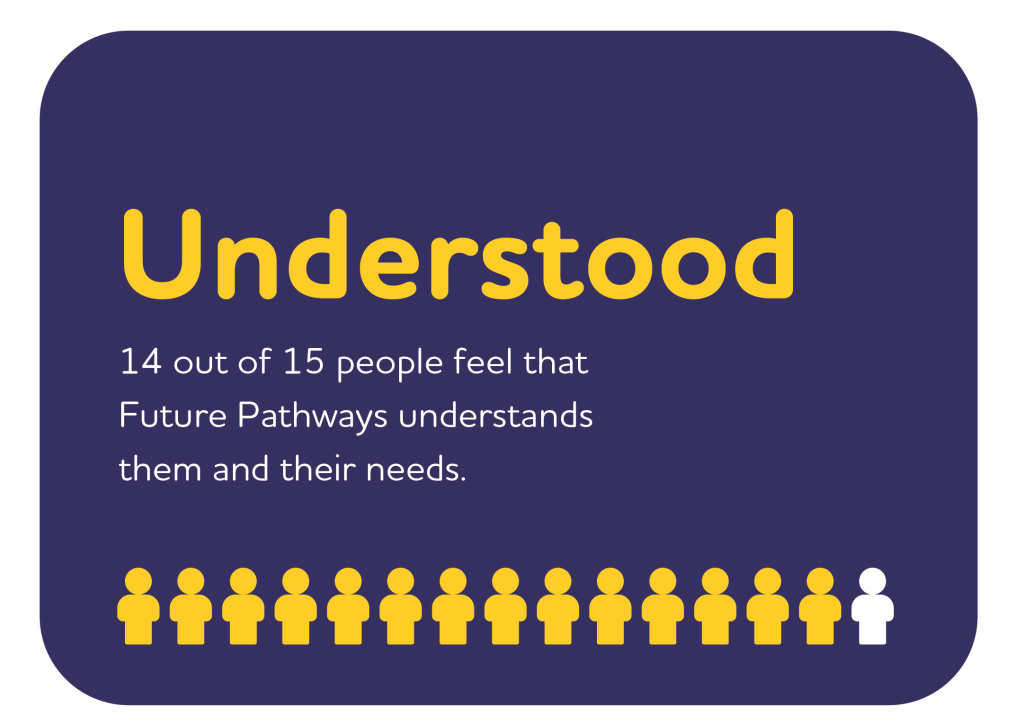
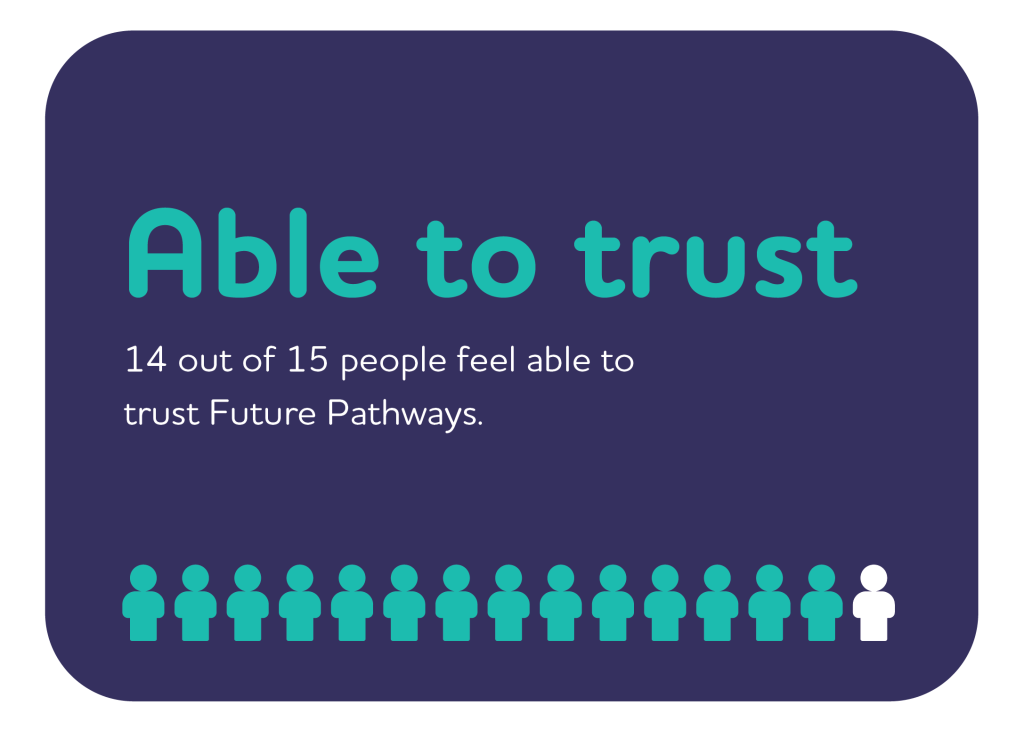
This approach extends to everyone we work with: people we support, our staff, our Delivery Partners and providers, and the wider sector. Indeed, a relational approach can itself enhance support. Our collaborative work with Delivery Partners and existing services can encourage others to adapt their approach and respond flexibly to people’s needs, ensuring people can access the support that is right for them and which they have a right to access.
We look forward to the next steps of our learning journey. Data-driven improvement gives us an opportunity to see how we can continue to make a difference, map our influence and, crucially, further improve the support we provide.
“Future Pathways has been committed to learning about our impact since we launched in 2016. Like our service, our evaluation has evolved over time. Throughout this journey, we have reflected continuously on our changing context, gradually refined our evaluation approach, and made improvements based on what we have learned from people registered with us. This iterative process has helped us develop a fuller, more nuanced understanding of our support and the difference we make. We hope that our learning continues to contribute towards the vision of the Alliance, that people registered with us can lead full, healthy and independent lives.”
Louise Hall, Impact and Evaluation Lead, Future Pathways
“Providing this feedback is helpful to me in allowing me to see the progress and I hope it helps Future Pathways to further continue the amazing work it does. Thanks for taking the time you have and dealing with my story in confidence and with empathy.”
Person supported by Future Pathways
“This report shows the value of taking time to build a relationship with a person and across services, and how this can enable life to feel more purposeful. This is particularly significant given the multiple inequalities that can be experienced by people registered with us. We are committed to sharing our learning more widely as we make meaningful changes in our own support and seek to capture when other services do the same.”
Flora Henderson, Alliance Manager, In Care Survivors Alliance
Daniel shares how exercise improved his physical and mental health, and helped him on his recovery journey.
I had a serious accident over 10 years ago and was paralysed down my right side. I was determined to get back functioning and active again. I went to physiotherapy. They used to come and get me to go to my appointments. I was ashamed of people seeing me the way I was. People made fun of me.
Eventually, I started doing exercises in the house after going to physio. I kept on doing my exercises every day. Butterflies and half butterflies. Shadow boxing. Knee bends. Building up all of them to twenty repetitions each, twice a day. This helped with my counting as well.
I started feeling a bit of a difference, could see I was getting stronger.
My partner bought me two TENS whole body vibration machines. Big things they were and she carried them all the way up the street on her own! What a change in me after I’d been using them for a while. The vibrations helped with my balance – and with my anxiety. There’s different things that’ve helped me along the way.
During this time I was also in recovery from addiction and dealing with lots of personal issues but I kept exercising all the way through it. Over time, I was able to use a mobility scooter to get back out and about. Then I got a dog and that kept me going too.
Eventually, after Covid, and when I started with Future Pathways, I also started going to the local Recovery Cafe. We were all talking about the nervous system and how exercise is good for improving it. From there I thought I would give swimming a try. Swimming started it all.
Some friends started encouraging me to do a round of golf – I’m now able to hit every single ball when at first the club used to go flying and my pals had to go and get it back for me! There’s been people encouraging me and I really appreciate that when I look back.
I try to encourage other people in recovery to go swimming and to take up golf and other exercise because of how it’s helped me.
I enjoyed doing all of these things but I also wanted to be able to do something on my own. I wanted to go out when I felt like it to exercise and not be dependent on recovery groups, or other groups or other people; just to have the freedom to exercise like everybody else. I’d starting thinking about cycling when I got my mobility scooter. Once I felt stronger, I bought a bike but I kept falling off because of my balance. I tried to get stabilisers put on my bike too. I wanted freedom and fresh air.
I talked to my worker at Future Pathways about options for cycling and we thought about a trike/recumbent bike. We went through to Edinburgh to try some out. The boy in the shop ran along the street beside me when I had a go. I thought to myself, this is it, this is what I want, this is what I’d like to do.
It made me feel good, gave me a sense of freedom and enjoyment.
After that we had to do the funding application. I was dead worried I wouldn’t get it – I just felt like things like this doesn’t happen to people like us, people down in the dumps all the time and thinking about the worst things happening; not thinking anything good can happen in your life.
Then, when I realised I was getting it, I didn’t know if I was excited or worried! I was thinking about the security. What if I leave it somewhere? But I realise now I can take the battery out it. The computer out of it. And the shop guy gave me a good security lock for free too.
The day I got the bike, I cycled back to the train station on it and my worker walked alongside me. I was a bit anxious getting it on to the train. I couldn’t believe it. I really couldn’t believe it. Things like that don’t happen to people like us. Anything good, people usually take it away from you.
On my street on that day, people from my local town were giving me encouragement, smiling and laughing with me. That was different – laughing with me and not at me. People were happy for me.
People have told me I’m a miracle. I’ve walked from Bathgate to Whitburn – that’s because of building up my strength on the bike. I want to keep building up my walking too.
The bike has been a godsend. I’ve done over 200 miles on it now. I’ve been to Bathgate and back. Whitburn, Blackburn, Bathgate, Armadale and back to Whitburn. I’ve also been to Harthill from Whitburn, up to Fauldhouse, Longridge and back to Whitburn. When I’m out I see people smile and cars going by give me a wee toot.
Physically, it’s amazing. When you’re sitting on it, it feels so much easier because of your balance being sorted by sitting down. You’re not on a two wheeler. It’s not just made a difference, it’s made a life changing difference. My physicality is developing, my confidence has grown and I’m hoping it will grow more.
I find it hard to talk to people. I’m practicing this and sometimes the bike helps with having something to talk about when I’m out.
I think it helps with different things. I’m getting buses myself – I wasn’t able to do that alone before. I went to see Rangers again. I think that was partly because of the bike too. The bike helps my mobility and feeling more confident in my mobility and physicality. And fresh air – it’s a better tablet than anything off the doctor. You’ll never get a better tablet than that.
It’s given me ideas for doing more. I’d like to do a Glasgow or Edinburgh cycle to raise money for a parachute jump. It’s got me thinking of what else I can do. I want to get other people into recovery. It’s gave me ideas of what else might be possible. Maybe even volunteering one day.
I’m looking for contentment and to be stress free. I’ve been in trouble all my life. The bike puts a smile on everybody’s face – that makes me feel a bit happier as well.
Under that Caledonian Sky
The many shades of purple hues and the russet
and golden ambers
Burn bright in that morning light
The morning call becoming deafening
As each bird trying to be heard.
I smile… what a glorious sound and vision I wake to
The mist is up the glen now, showing more of the hillside’s glory
The dark bracken mingles with the multi-coloured flowers and heathers
That are searching for that morning sun.
Oh, what a bonny sight to see
It evokes emotions that awake you
Ready for the hearty breakfast smell that is wafting into my room
It’s a shame I’ll never walk under those skies again.
So I say my farewells
Oh glorious Caledonia sky
Farewell, farewell.
But I know you will never be lonely
You’re too beautiful, a sight to behold
So go, you lonely traveller
And lie under that Caledonian sky.
Eileen has published a collection of poetry. It is called ‘The Nightmares and Dreams of a Broken Wee Lassie’s Life’.
You can buy the poetry book on Amazon and from Waterstones.
Eileen is also working on a second book which will soon be published. Her story is made up of 5 books in total.
You can listen to Eileen reading her poetry on her Youtube channel. Visit: www.youtube.com/@eileencormack3866
Joyce creates a range of wonderful pieces. This includes artwork,
embroidery, knitting and spinning. Check out the collection of her fantastic
creations below.
Painting and embroidery
“I was walking through Balquhidder Braes one day and came into a clearing. I realised I had stumbled across Oberon’s Garden.”
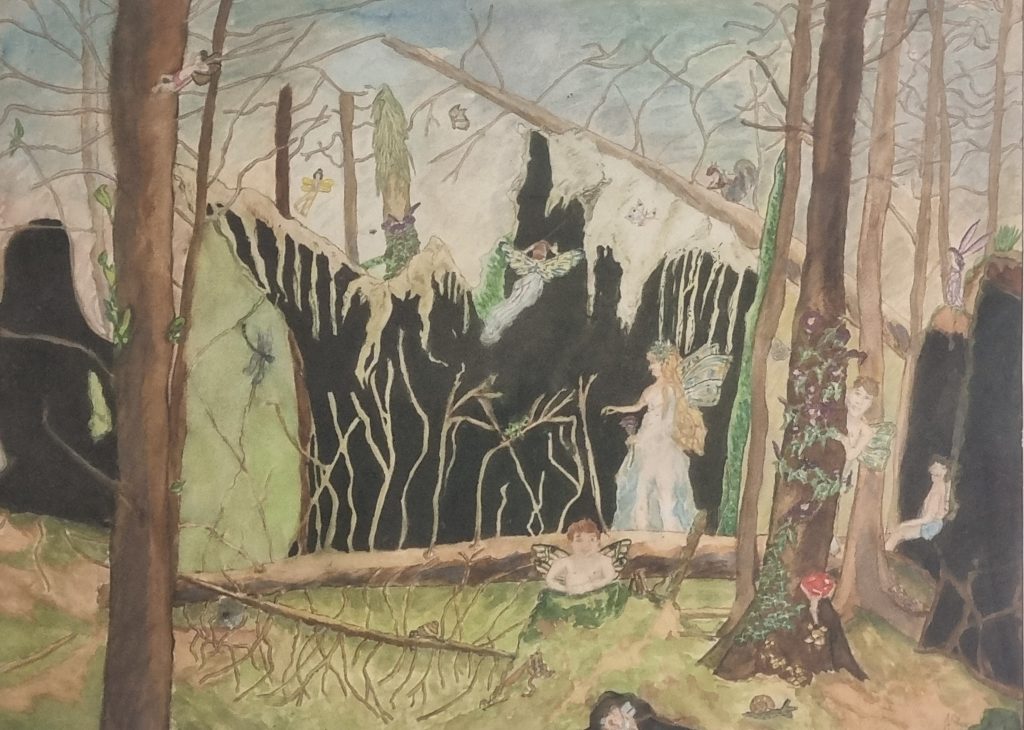
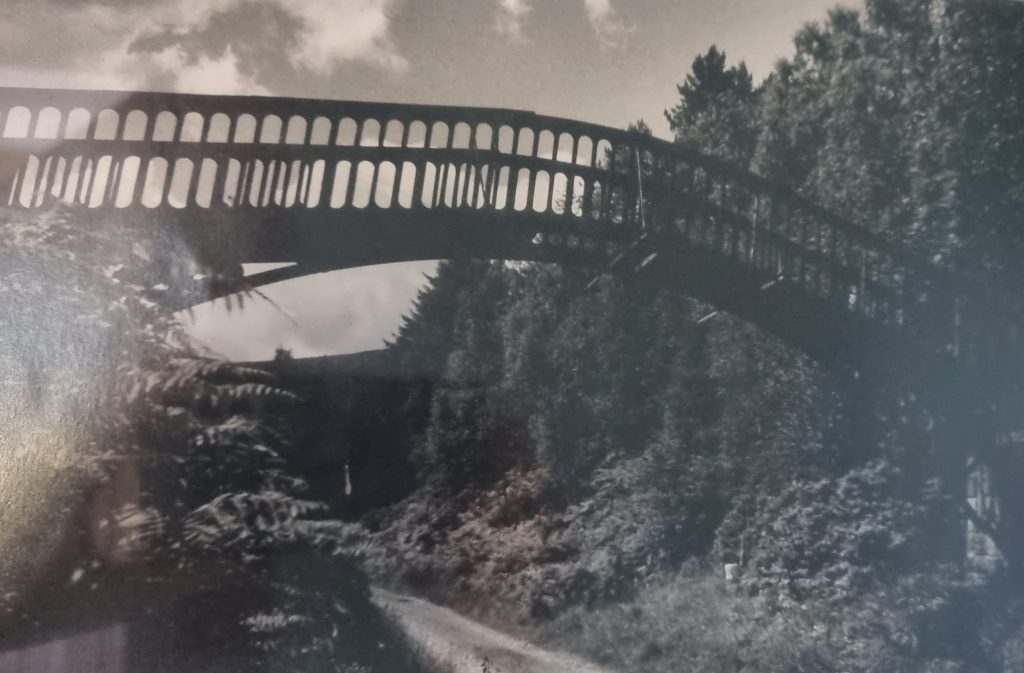
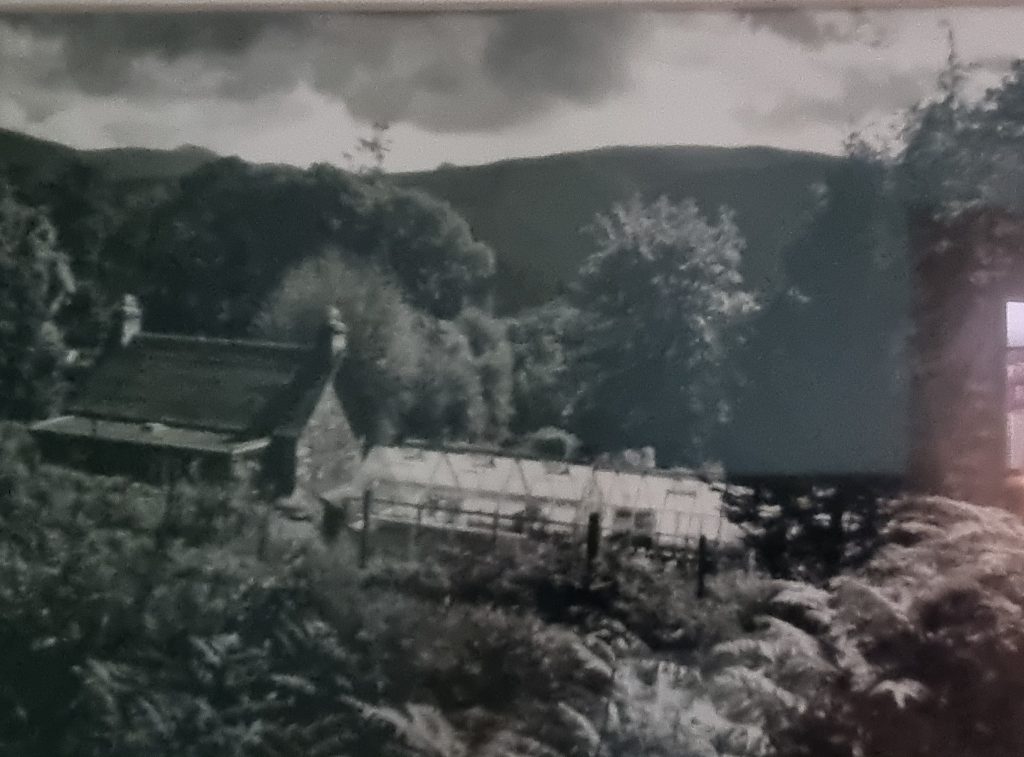
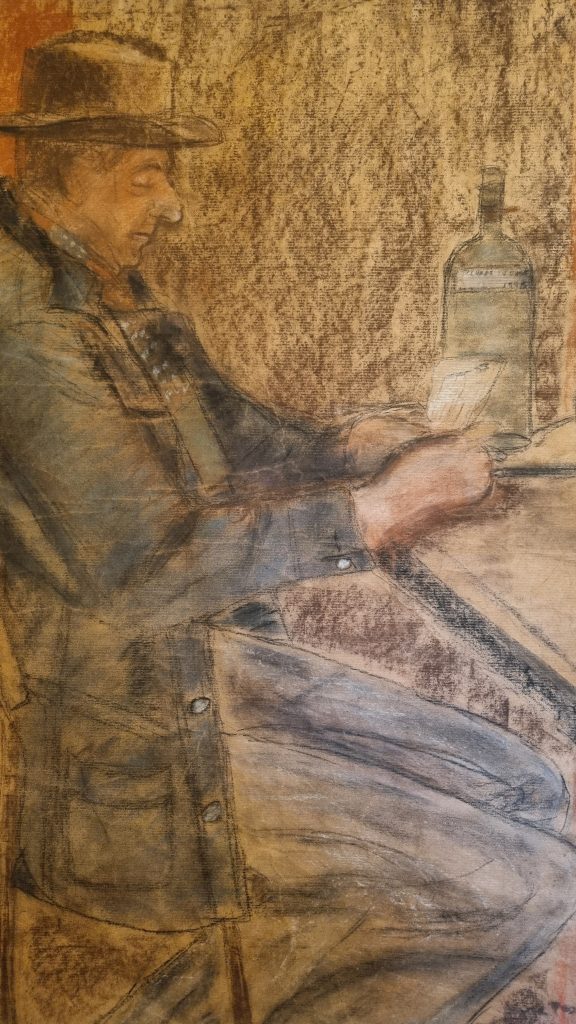
“Pastels on brown paper. My interpretation of The Poker Player by Paul Gauguin. The first piece I did when I started at Dundee college in 1996.
With painting, I always wanted to learn but father wouldn’t allow it as ‘you can’t make a living with a paintbrush’. I went to college then uni as a mature student/single mum and learned.”
Bags and purses
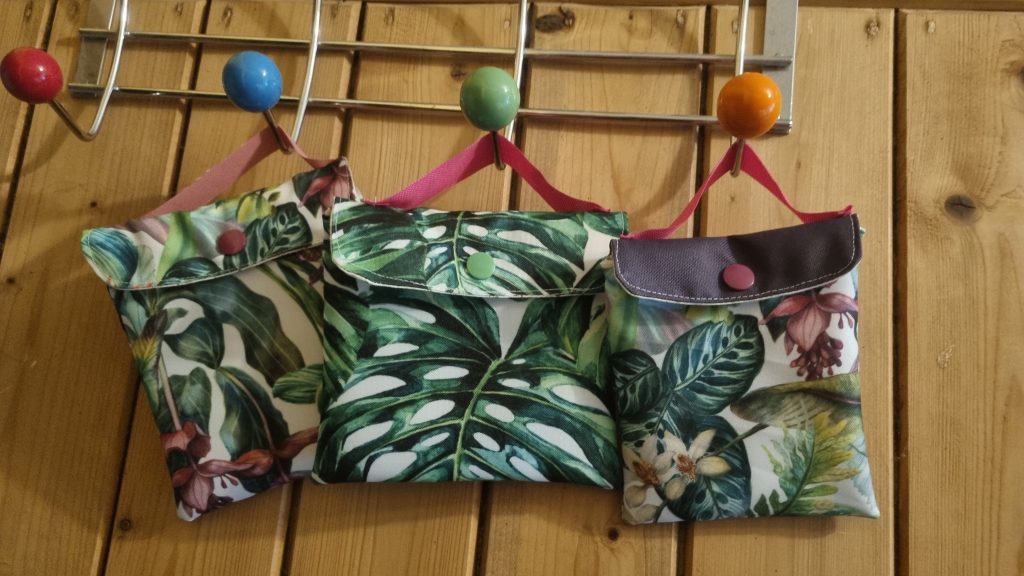
Joyce also makes gowns for angel babies. Angel babies are babies sadly lost due to miscarriage or as an infant.
“I was asked by a mum of two sets of premature twins if I could make clothes for the preemie babies at Ninewells hospital. She later asked if I could make the little gowns for angel babies. I consider it a great privilege to be able to do this and Future Pathways helped me to buy a new sewing machine for this. I’m now looking for other hospitals who may need the gowns. I lost a baby many years ago and never came to terms with it. However, through doing this, I have finally found peace.”
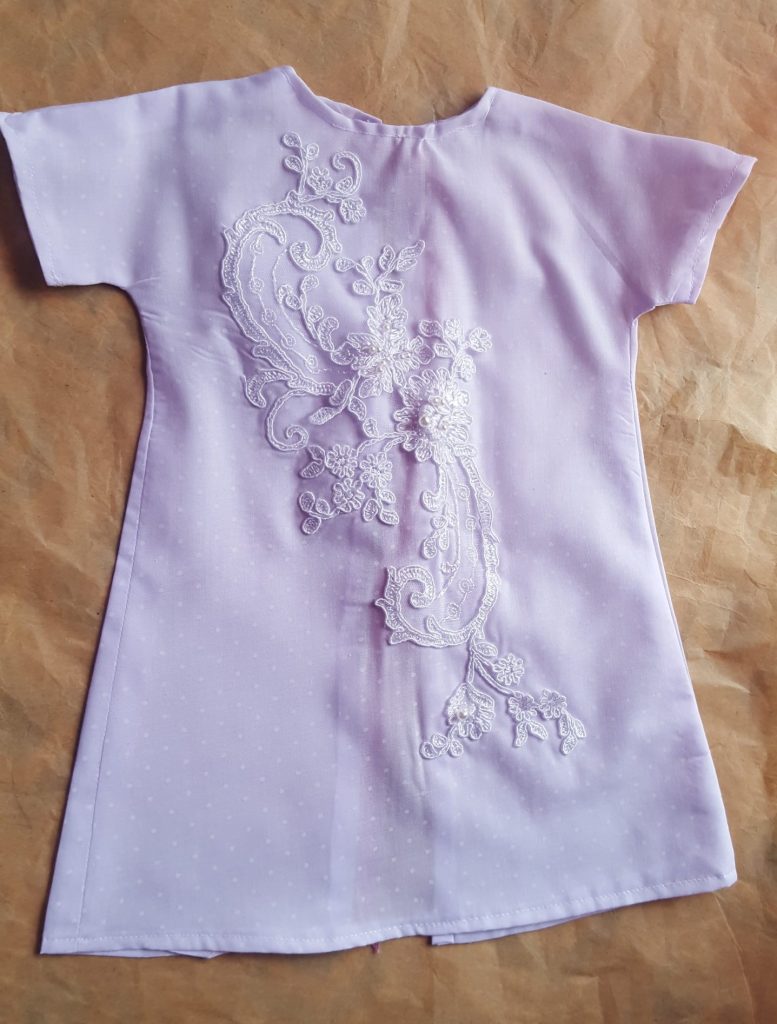
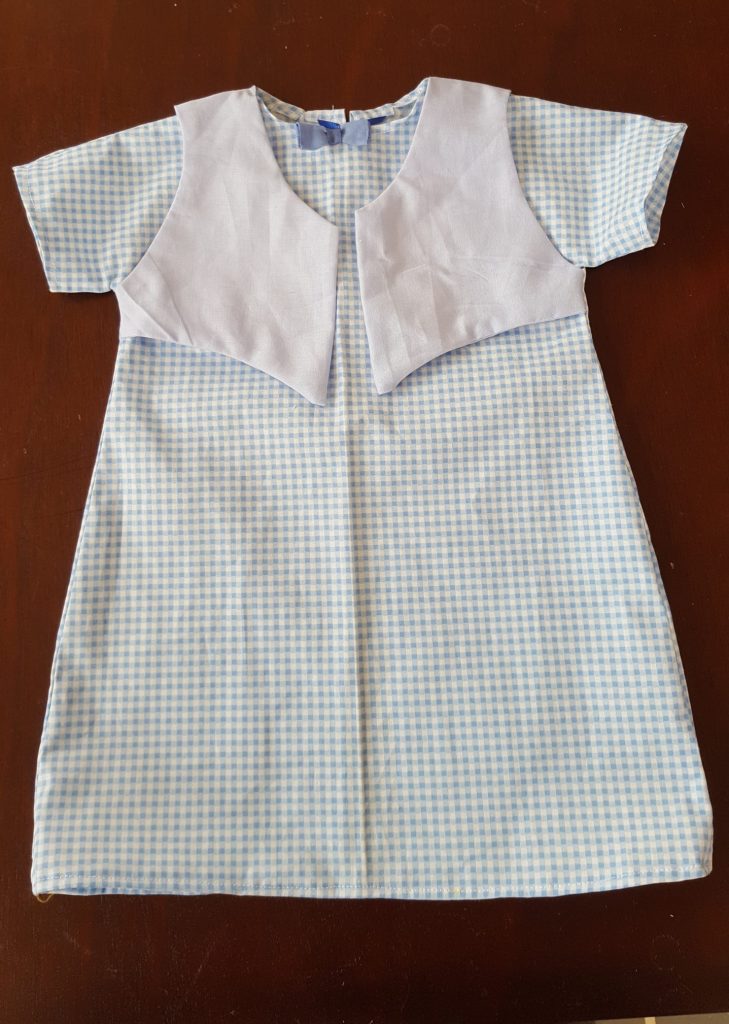
Spinning
“Spinning is my therapy. I have a few spinning wheels but the Ashford Traveller is my favourite. I spin anything from recycled plastic bottles to nettles to rose stem fibre but have a passion for rare, exotic fibres.”
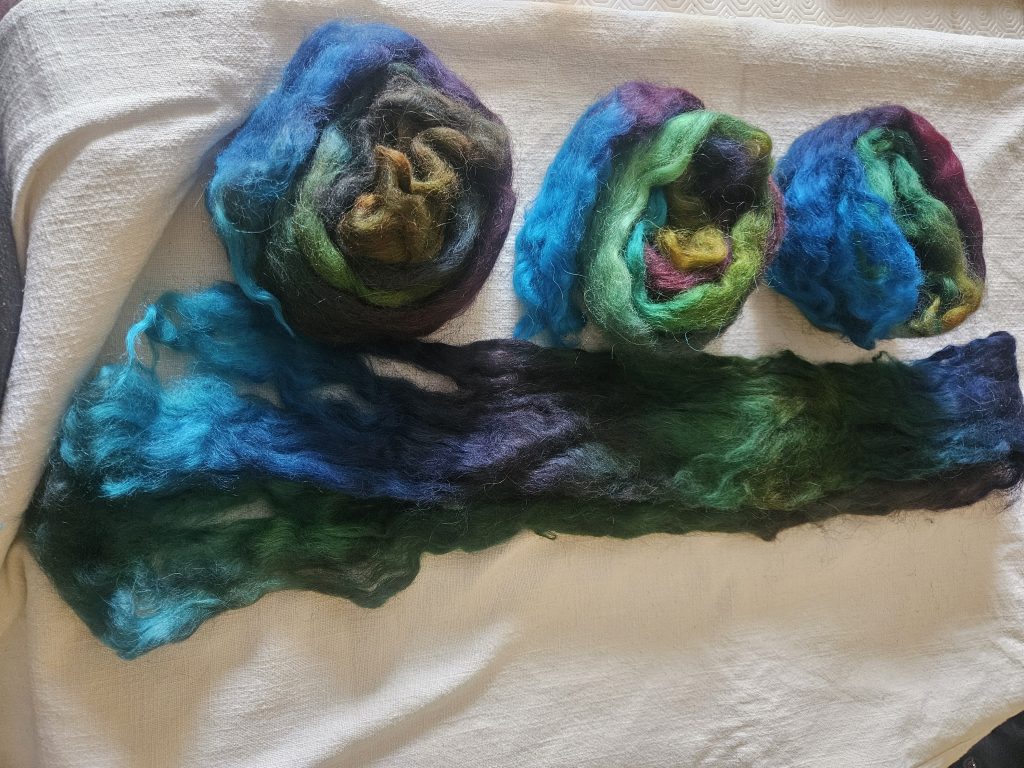
Above: Norwegian fleece that Joyce has dyed herself
Above: yellow and blue is rambouillet mix (rambouillet is a type pf sheep), the brown fibre is qiviut (musk ox) which is a beautiful soft fibre, and vicuna is a very expensive fibre.
Kirsty is really interested in trying different things that can benefit health and wellbeing. Here, she shares some examples of the things she has tried during her recovery journey.
Coming from a traumatic childhood, I did what most people done and learned to live with it, not fix it. Over the years, you don’t even recognise the triggers of trauma – you think the responses to triggers are yours.
My adult life seen me in many situations that seemed bad pot luck, until I couldn’t cope anymore. I turned to private counselling, and in doing so, was introduced to Future Pathways to fund it. I remained in counselling for 4 years, which worked to let me dig deeper within myself, by talking therapy, but didn’t actually allow me to heal in any real way.
During this process, always being a bit of a hippy, I started meditation, something I found extremely difficult as my panic attacks resulted in me being unable to focus on my breathing to get into a meditative state. It would send me into a panic.
I persevered and eventually was able to use meditation as a way to calm my mind.
This lead to using binaural beats and hemi sync meditations. These methods sync both hemispheres of the brain and take you to deeper levels of meditation. This led me into digging further into the science behind frequencies and vibrations. I like to understand the science behind why these methods were working.
And, seeing fast results, these methods allowed me to meditate and open myself up to the traumas in a calm, non-invasive way. Almost not even knowing that this is what I was doing. I was able to pick away at traumas without even really feeling them. Able to look at them without emotional attachment. Healing myself bit by bit without having to face the enormity of it.
I began to really get to know who I was behind all my usual barriers.
And if I can give something back, this is what I want to give back – a way for people to heal without have to return time and time again to professionals. For people to know that they can do this themselves, and give people the experience of this and the tools to walk away after a couple of sessions equipped with the knowledge of how to self-heal.
I feel that until you face your trauma and your triggers of trauma, that you cannot truly heal. The best and safest way to do this is through meditation, using sound frequencies and vibrations. It helps the mind focus , stay calm and heal, healing DNA, rewiring the brain, just for starters.
My plan is to start my own business using instruments that create sound waves and vibrations that resonate with the mind and body.
I want to take people through meditations safely, showing them every step of the way how and why to do this. Ensuring that they don’t need more than a couple of treatments maximum so they can take it away, practice it and find what works best for them and show others how to heal themselves.
My Support Coordinator has been an absolute god send, always there, always cheerleading my corner, and always highlighting my abilities. I cannot thank her enough for the encouragement this woman has shown me.
Alongside my Support Coordinator, I was given Graham from Gro-Wiser. He is a financial coach and has been a god send. Not just immense help with finances but also encouraging and cheerleading my ambitions.
Future Pathways has been more than I could have ever imagined they would be.
They have helped with so much, from funding lots of classes that will help me to fulfil my ambition, to being my biggest supporters. And I appreciate every minute I have had with them.
One day you will get there, and it will be yourself who gets you there. I encourage anyone experiencing difficulties coping in life to try and meditate. Even baby steps are still steps. I can guarantee you will find your peace. You will learn to love yourself and not care what the rest of the world thinks of you, because only your opinion will matter.
